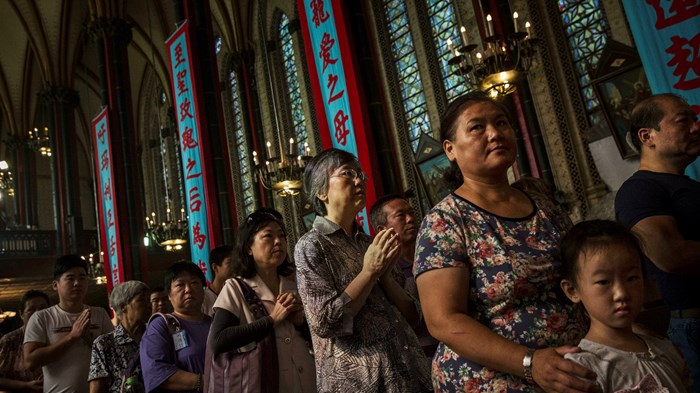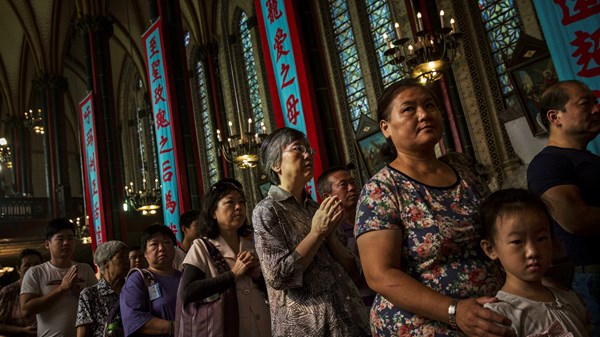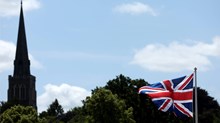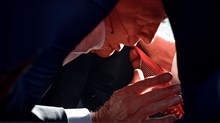

Barely a week after the bombing of churches and hotels in Sri Lanka killed nearly 300 on Easter Sunday, and a day after six Christians were killed at their church in Burkina Faso, the United States Commission on International Religious Freedom (USCIRF) made clear that the worst violators of religious freedom are gaining steam.
The findings are grim in 2019 report and echo the conclusions from this year’s Open Doors rankings, with China taking the brunt of the critique.
“As a Christian [living in China], your Bible may have been rewritten by the Chinese government, your church shuttered or demolished, and your pastor imprisoned,” the commission wrote. “As a human rights defender who works to protect people targeted for their faith, you may be arrested, or worse, disappeared.”
According to commissioner Johnnie Moore, this year’s report represents “the strongest stance against China in the history of the USCIRF.”
China was a primary focus of the first-ever USCIRF report released two decades ago, along with Russia and Sudan. The world’s most populous nation remains a Tier 1 “country of particular concern” (CPC) today, having made the list in each of the 20 annual releases. China also jumped to No. 27 on the 2019 World Watch List, which tracks the countries where it is hardest to be a Christian.
Christians and adherents of other faiths in China have seen an uptick in persecution as President Xi Jinping has consolidated power and abolished term limits, easing the way for a harsh government crackdown on believers and advocates of religious freedom.
Ministry leaders have weighed whether the moves represent “a step toward tighter government control, an opportunity to further indigenize and contextualize the faith, or perhaps both.”
In the past year, China banned the online purchase of Bibles, shuttered hundreds of churches—including major Protestant gatherings like Shouwang Church, Early Rain Covenant Church, and Zion Church—and pressed hard for the “sinicization” of religious institutions across China. Just last month, Hong Kong pastor Chu Yiu-ming and eight other activists were convicted for crimes related to their participation in pro-democracy movements.
David Curry, president of Open Doors USA, told Mission Network News after the commission’s release, “It’s just stunning the levels to which China is now going to persecute and to hold down the expression of Christian faith.”
But Christians have not been the only ones to suffer. Tibetan Buddhists are forbidden from displaying photos of or expressing public devotion to their spiritual leader, the Dalai Lama; hundreds of Falun Gong adherents were arrested for their faith; and a million ethnic Uighur Muslims have been forced into concentration camps. Of the more than 1,400 prisoners of conscience imprisoned in China as of last October, approximately half of them were detained, at least partly, for participating in religious practices “unauthorized” by Beijing.
“If we were to rate the Tier 1 countries, China would be in a category all by itself,” said USCIRF Commissioner Gary Bauer in a news conference in Washington, DC. “The level of persecution—they are an equal opportunity persecutor. They go after anybody, any sect that might compete with the communist, atheistic government of China.”
USCIRF is an independent, bipartisan group tasked with making policy recommendations around religious freedom abroad. In this year’s report, the authors noted that China has faced “few, if any consequences” for its abuses of religious freedom, despite US condemnation.
“Policy and practice now must focus on holding the responsible parties accountable,” they said, “ceasing China’s myriad abuses against all faith communities, and documenting the evidence of the atrocities that have occurred.”
The 28 countries and five terror entities USCIRF identifies as the worst in the world in terms of their assaults on religious freedom are nearly identical to the 2018 list, though the commission has recommended additions to the State Department’s official list of CPCs, which is more limited.
According to the commission, the 16 worst countries for their abuses of freedom of religion and conscience are Burma, the Central African Republic, China, Eritrea, Iran, Nigeria, North Korea, Pakistan, Russia, Saudi Arabia, Sudan, Syria, Tajikistan, Turkmenistan, Uzbekistan, and Vietnam.
All but one of these countries—Russia—make the top 30 most dangerous places to be a Christian according to the World Watch List. The commission notes how faiths and denominations not aligned with Moscow are perceived as foreign, missionary activity can be prosecuted or blanketed as “extremism,” religious groups are readily intimated, and the 2016 Yarovaya Law effectively banned public evangelism.
Per the report’s analysis on Russia: “Religious and other communities can be financially blacklisted or liquidated, and individuals can be subjected to criminal prosecution for social media posts that are arbitrarily determined to offend the religious sensibilities of others.”
Russia earned a spot among the commission’s top-tier countries for the first time in 2017 after it banned Jehovah’s Witnesses as extremists and was found to persecute religious minorities in Crimea and Donbas.
“In 2018, both state and nonstate actors increasingly used religion as a tool of exclusion to isolate, marginalize, and punish the ‘other’ through discrimination and violence,” says USCIRF.
The commission proposes a variety of policy recommendations in response to what it calls “systematic, ongoing, egregious violations of religious freedom.” They include increased sanctions, aid programs that promote tolerance and respect for human rights, and increased funding to antiterrorism and defense programs.
Notably, of the 10 current CPCs listed by the State Department, four countries—Saudi Arabia, Tajikistan, Turkmenistan, and Pakistan—are spared sanctions due to what the report calls the “important national interest of the United States.”
USCIRF’s list of Tier 2 countries, those that don’t meet all the qualifications of Tier 1 offenders but where the government engages in or permits significant religious freedom violations, includes Afghanistan, Azerbaijan, Bahrain, Cuba, Egypt, Indonesia, India, Iraq, Kazakhstan, Laos, Malaysia, and Turkey.
The report’s five “entities of particular concern” are the Islamic State, the Taliban, Somalia’s al-Shabaab, and, newly added this year, Yemen’s Houthis and Syria’s Hay’at Tahrir al-Sham.

Support Our Work
Subscribe to CT for less than $4.25/month


















